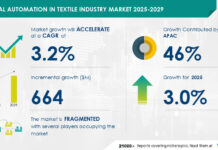It has been projected for many years that artificial intelligence would be a game-changer in the retail industry. Right now, it is making its full arrival in retail supply chains, and it is producing revolutionary effects very immediately after it is implemented. This technology, in conjunction with the continually expanding use cases it offers for supply chain operations, is improving both the speed and efficiency of operations to a new level. Because of the tightening of global rules, it is becoming more impossible to maintain compliance and efficiency without the use of advanced digital systems. This is another reason why it is becoming an essential component of the movement towards ecological sustainability. In this way, for instance, it assists in optimizing routes and inventory, so decreasing waste and fuel use is not essential.
As AI continues to advance, it is prepared to take on jobs that are ever more sophisticated. For the foreseeable future, applications are expected to expand into autonomous decision-making, in which artificial intelligence systems will not only generate predictions but also make modifications to supply chains in real time with little involvement from humans. The majority of the end-to-end procedures of the supply chain, from the procurement of raw materials to the delivery of products to customers, are likely to be managed by advanced artificial intelligence. This more in-depth integration has the potential to convert conventional supply chain models into dynamic, predictive networks that are better able to adapt to global problems and variations in the market.
Although it is understandable that global clothing and footwear manufacturers and retailers are eager to incorporate artificial intelligence into their supply chain operations, the reality is that many of them have not yet developed the digital infrastructure necessary to do so. One of the most significant barriers that prevents organizations from fully realizing the promise of artificial intelligence is the absence of centralized, organized, and real-time private data. It is necessary for businesses to begin the process of establishing a common repository of supply chain data at the PO, SKU, and plant levels in order to address this challenge.
The capacity to link millions of proprietary data points from numerous data sets throughout your company is the basis for optimizing the advantages of artificial intelligence for any organization. This is the foundation for optimizing the benefits of AI. This necessitates the compilation of all data, beginning with the preliminary stages of planning and continuing through the formulation of product specifications, sourcing, pricing, and logistics, as well as the inclusion of precise information on all suppliers along the supply chain, all the way up to the Nth layer. Businesses will not be able to begin unlocking the full potential of artificial intelligence unless they have first created an efficient data management system.
Through the use of a multi-enterprise platform, digitalization guarantees that data is up to date, accurate and accessible, therefore laying the groundwork for the use of artificial intelligence. Real-time supply chain visibility is provided by these systems, which enables organizations to continually monitor their supply chains, spot possible problems before they become more severe, and make choices that are guided by information that is accurate and up to date. When it comes to providing artificial intelligence with the data it requires for predictive analytics and automated decision-making, the establishment of this solid digital infrastructure is fundamental.
Already, these multi-enterprise platforms are using artificial intelligence in novel ways, and their capabilities are continuously developing. Chain of custody technologies that are driven by artificial intelligence have the potential to dramatically improve traceability via the automation of documents verification and the documentation of the chain of custody for all goods. These technologies do proactive risk assessments of compliance and make certain that every link in the supply chain satisfies a company’s requirements of sustainability. Additionally, they create all chain of custody records that are required to comply with the intricate web of global ESG (environmental, social, and governance) rules. Compliance with global environmental, social, and governance rules, such as the Uyghur Forced Labor Prevention Act, is significantly simplified by this artificial intelligence. It does this by automatically screening and validating all papers against several databases of banned businesses, as well as finding gaps or missing paperwork before shipment.
Additionally, artificial intelligence is rethinking quality management in the textile and footwear industries. To assess the possibility of a product line failing quality inspections, an innovative new application optimizes quality inspections by analyzing hundreds of data points around risk variables such as product type, materials used and country of origin. This allows the program to maximise the efficiency of quality inspections. By proactively identifying and addressing high-risk PO product lines, organizations are able to prioritize quality inspections around high-risk products, hence decreasing inspection costs while simultaneously boosting product quality. This capacity is made possible by the implementation of this capability.
Considering that garment firms, along with their counterparts in a wide variety of other sectors, are on the verge of a digital revolution that will be propelled by artificial intelligence, the prospects for change are enormous. If companies and retailers are able to successfully incorporate artificial intelligence into their supply chains, they will not only be able to achieve higher operational savings, but they will also gain competitive advantages in terms of agility, consumer happiness, and sustainability.
In order to fully capitalise on the enormous potential of artificial intelligence, garment companies need to make the digitalization of their supply chain a priority right now. Otherwise, they run the danger of losing out on important breakthroughs.






























